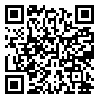Volume 32, Issue 3 (Summer 2024)
Avicenna J Nurs Midwifery Care 2024, 32(3): 196-205 |
Back to browse issues page
Ethics code: IR.SSU.REC.1401.004
Clinical trials code: IRCT20230130057276N1
Download citation:
BibTeX | RIS | EndNote | Medlars | ProCite | Reference Manager | RefWorks
Send citation to:



BibTeX | RIS | EndNote | Medlars | ProCite | Reference Manager | RefWorks
Send citation to:
Sedighi Z, Namjou Z, Pourmovahed Z. Effect of Spiritual Care Training on Self-efficacy of Mothers with Premature Infants in Neonatal Intensive Care Units: A Randomized Clinical Trial Study. Avicenna J Nurs Midwifery Care 2024; 32 (3) :196-205
URL: http://nmj.umsha.ac.ir/article-1-2720-en.html
URL: http://nmj.umsha.ac.ir/article-1-2720-en.html
1- School of Nursing and Midwifery, Shahid Sadoughi University of Medical Sciences, Yazd, Iran
2- Research Center for Nursing and Midwifery Care, Non-communicable Diseases Research Institute, School of Nursing and Midwifery, Shahid Sadoughi University of Medical Sciences, Yazd, Iran
3- Research Center for Nursing and Midwifery Care, Non-communicable Diseases Research Institute, School of Nursing and Midwifery, Shahid Sadoughi University of Medical Sciences, Yazd, Iran ,movahed446@yahoo.com
2- Research Center for Nursing and Midwifery Care, Non-communicable Diseases Research Institute, School of Nursing and Midwifery, Shahid Sadoughi University of Medical Sciences, Yazd, Iran
3- Research Center for Nursing and Midwifery Care, Non-communicable Diseases Research Institute, School of Nursing and Midwifery, Shahid Sadoughi University of Medical Sciences, Yazd, Iran ,
Abstract: (3855 Views)
Background and Objective: The birth of a premature infant is associated with a crisis in mothers. They need to acquire the ability to care for the infant and self-efficacy in this field. Spiritual care is one of the ways that increases self-efficacy in mothers. The present study aimed to investigate the effect of spiritual care training on the self-efficacy of mothers with premature infants in neonatal intensive care units (NICUs).
Materials and Methods: This randomized clinical trial study was done on 60 mothers of premature infants hospitalized in the NICU of Yazd Shahid Sadoughi Hospital in 2022. Samples were selected by convenience sampling method and were randomly assigned to two groups. Before the intervention, mothers' self-efficacy was measured in both groups. Necessary training was provided for the intervention group in four 45-minute sessions. Three weeks later, the self-efficacy of mothers in both groups was measured again. The data was collected using a demographic form and Pennell's Self-Efficacy Questionnaire. Mothers in the control group received usual ward care. The data were analyzed in SPSS version 24 software using independent t-test, paired t-test, Chi-square, and Fisher test.
Results: The mean scores of mothers' self-efficacy in the pre-intervention phase were 182.13±21.81 in the control group and 174.10±23.25 in the test group. There was no significant difference between the groups in this regard (P>0.05). After the intervention, the mean self-efficacy scores of mothers in the control and test groups were 192.40±19.76 and 202.13±25.08, respectively, which showed a significant increase compared to before the intervention (P<0.05).
Conclusion: Spiritual care training increased the self-efficacy of mothers with premature infants in taking care of the infant and enhanced their feelings of adequacy. This intervention is low-cost and practical. It is recommended to reduce the rate of re-hospitalization of infants, as well as minimize neonatal complications and injuries.
Materials and Methods: This randomized clinical trial study was done on 60 mothers of premature infants hospitalized in the NICU of Yazd Shahid Sadoughi Hospital in 2022. Samples were selected by convenience sampling method and were randomly assigned to two groups. Before the intervention, mothers' self-efficacy was measured in both groups. Necessary training was provided for the intervention group in four 45-minute sessions. Three weeks later, the self-efficacy of mothers in both groups was measured again. The data was collected using a demographic form and Pennell's Self-Efficacy Questionnaire. Mothers in the control group received usual ward care. The data were analyzed in SPSS version 24 software using independent t-test, paired t-test, Chi-square, and Fisher test.
Results: The mean scores of mothers' self-efficacy in the pre-intervention phase were 182.13±21.81 in the control group and 174.10±23.25 in the test group. There was no significant difference between the groups in this regard (P>0.05). After the intervention, the mean self-efficacy scores of mothers in the control and test groups were 192.40±19.76 and 202.13±25.08, respectively, which showed a significant increase compared to before the intervention (P<0.05).
Conclusion: Spiritual care training increased the self-efficacy of mothers with premature infants in taking care of the infant and enhanced their feelings of adequacy. This intervention is low-cost and practical. It is recommended to reduce the rate of re-hospitalization of infants, as well as minimize neonatal complications and injuries.
Type of Study: Original Research |
Subject:
Nursing
Received: 2023/06/22 | Accepted: 2023/10/15 | Published: 2024/09/19
Received: 2023/06/22 | Accepted: 2023/10/15 | Published: 2024/09/19
Send email to the article author
| Rights and permissions | |
 |
This work is licensed under a Creative Commons Attribution-NonCommercial 4.0 International License. |







 gmail.com
gmail.com